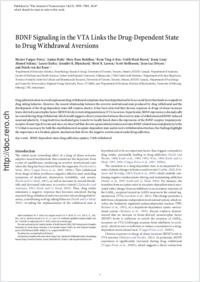BDNF signaling in the VTA links the drug-dependent state to drug withdrawal aversions
- Vargas-Perez, Hector Department of Molecular Genetics, Neurobiology Research Group, University of Toronto, Canada,
- Bahi, Amine Department of Anatomy, Faculty of Medicine and Health Sciences, United Arab Emirates University, Alabama Ain, United Arab Emirates,
- Bufalino, Mary Rose Department of Medical Biophysics, Terrence Donnelly Centre for Cellular and Biomolecular Research, University of Toronto, Canada,
- Ting-A-Kee, Ryan Department of Molecular Genetics, Neurobiology Research Group, University of Toronto, Canada,
- Maal-Bared, Geith Department of Molecular Genetics, Neurobiology Research Group, University of Toronto, Canada,
- Lam, Jenny Department of Molecular Genetics, Neurobiology Research Group, University of Toronto, Canada,
- Fahmy, Ahmed Department of Molecular Genetics, Neurobiology Research Group, University of Toronto, Canada,
- Clarke, Laura Department of Molecular Genetics, Neurobiology Research Group, University of Toronto, Canada,
- Blanchard, Jennifer K. Department of Psychology and Center for Neuroscience, Brigham Young University, Provo, Canada
- Larsen, Brett R. Department of Psychology and Center for Neuroscience, Brigham Young University, Provo, Canada
- Steffensen, Scott Department of Psychology and Center for Neuroscience, Brigham Young University, Provo, Canada
- Dreyer, Jean-Luc Department of Medicine, Division of Biochemistry, University of Fribourg, Switzerland
- Kooy, Derek van der Department of Molecular Genetics, Neurobiology Research Group, University of Toronto, Canada,
-
06.04.2014
Published in:
- The Journal of Neuroscience. - 2014, vol. 34, no. 23, p. 7899–7909
English
Drug administration to avoid unpleasant drug withdrawal symptoms has been hypothesized to be a crucial factor that leads to compulsive drug-taking behavior. However, the neural relationship between the aversive motivational state produced by drug withdrawal and the development of the drug-dependent state still remains elusive. It has been observed that chronic exposure to drugs of abuse increases brain-derived neurotrophic factor (BDNF) levels in ventral tegmental area (VTA) neurons. In particular, BDNF expression is dramatically increased during drug withdrawal, which would suggest a direct connection between the aversive state of withdrawal and BDNF-induced neuronal plasticity. Using lentivirus-mediated gene transfer to locally knock down the expression of the BDNF receptor tropomyosin-receptor-kinase type B in rats and mice, we observed that chronic opiate administration activates BDNF-related neuronal plasticity in the VTA that is necessary for both the establishment of an opiate-dependent state and aversive withdrawal motivation. Our findings highlight the importance of a bivalent, plastic mechanism that drives the negative reinforcement underlying addiction.
- Faculty
- Faculté des sciences et de médecine
- Department
- Département de Médecine
- Language
-
- English
- Classification
- Biological sciences
- License
-
License undefined
- Identifiers
-
- RERO DOC 211461
- DOI 10.1523/JNEUROSCI.3776-13.2014
- Persistent URL
- https://folia.unifr.ch/unifr/documents/303557
Statistics
Document views: 105
File downloads:
- pdf: 197
